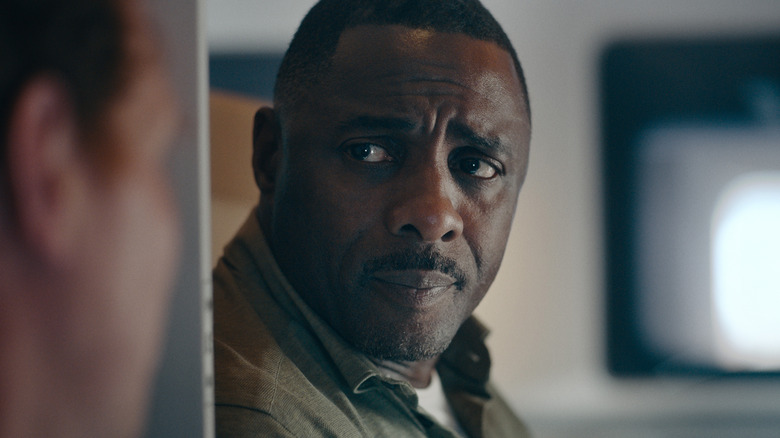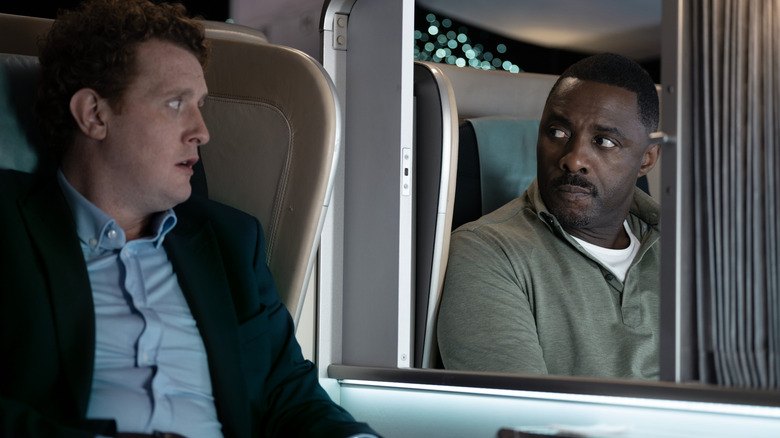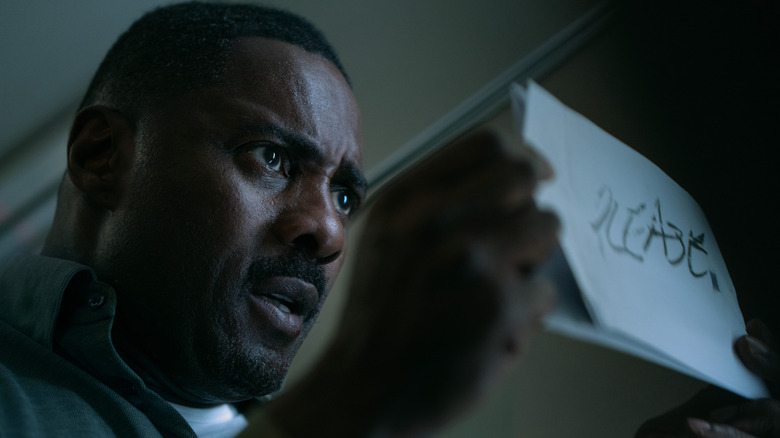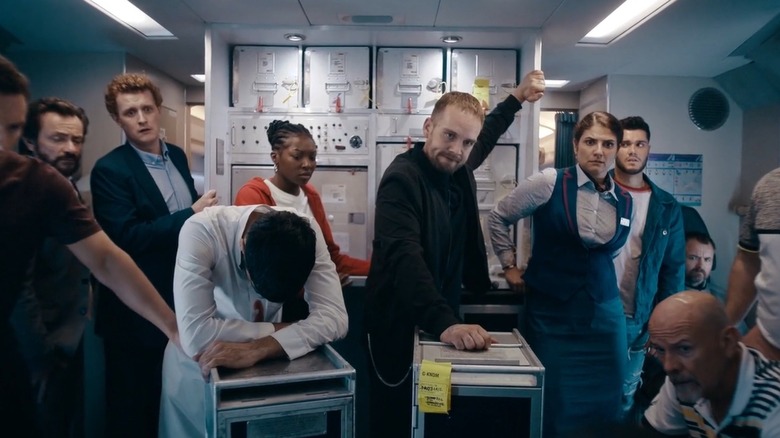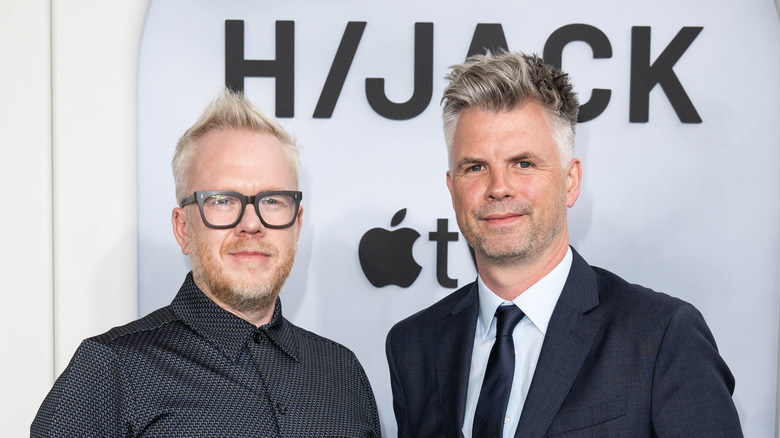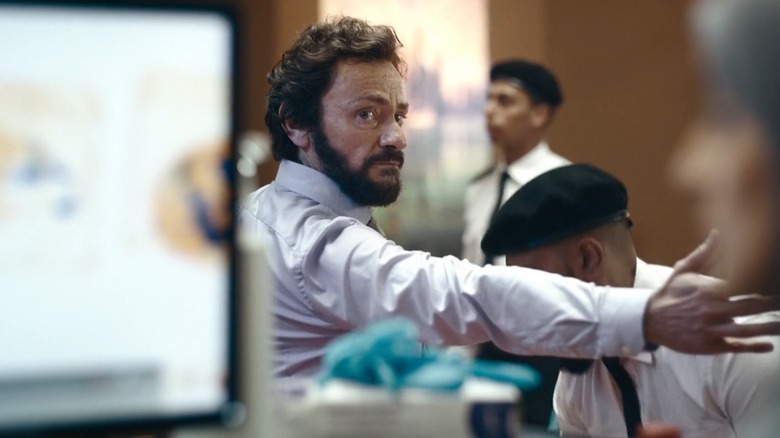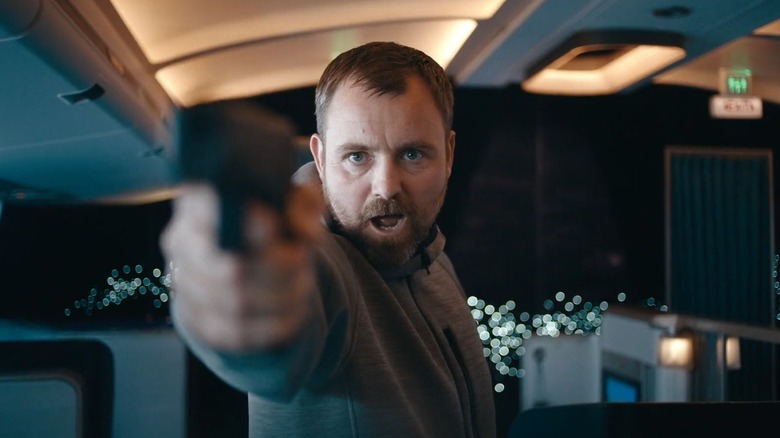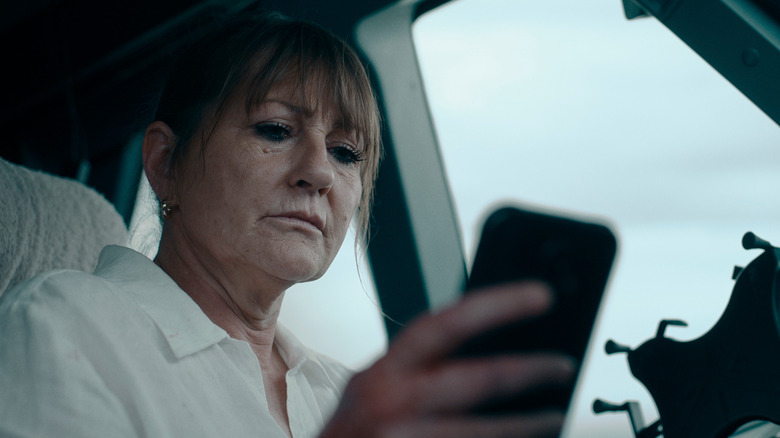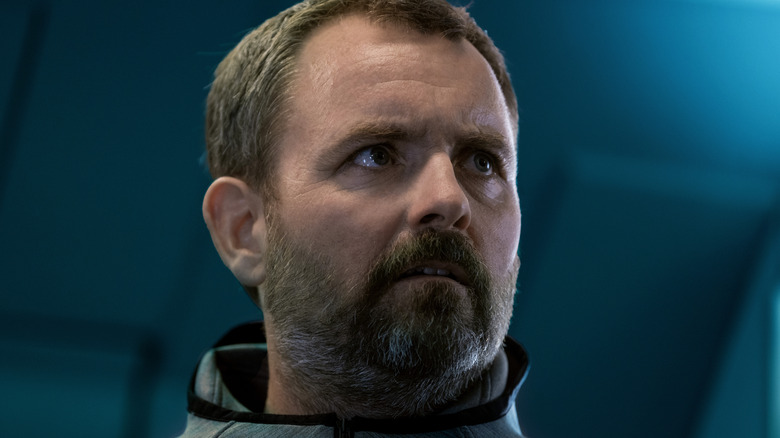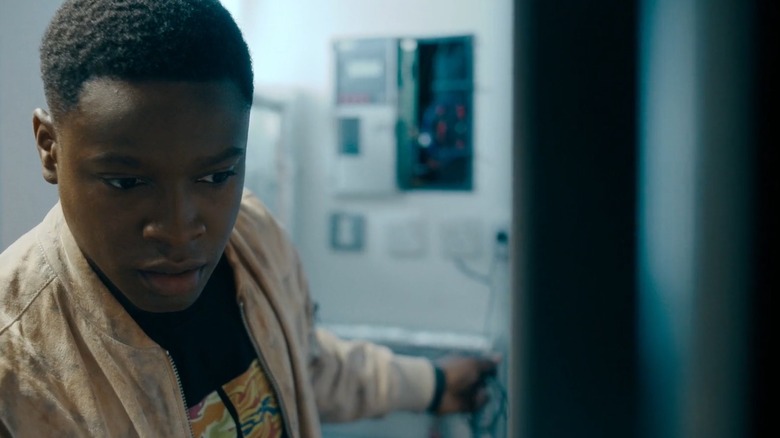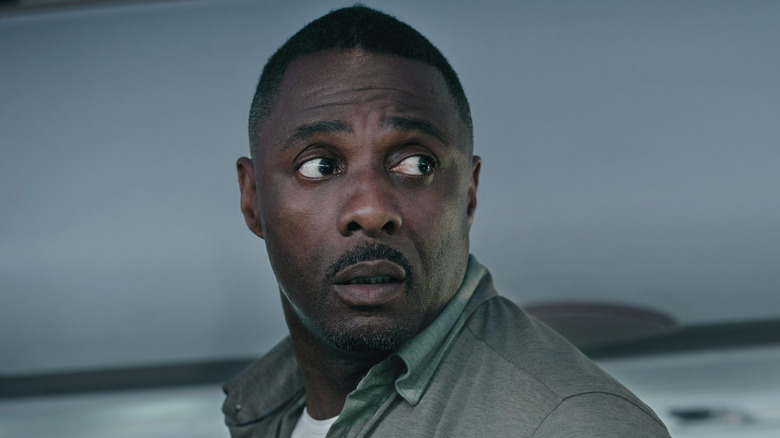The Ending Of Hijack Season 1 Explained
Contains spoilers for "Hijack" Season 1
Idris Elba's onscreen persona evokes a sense of calm and trust within audiences. In his most notable roles, he consistently embodies authority figures — a cop, an all-seeing Asgardian deity, or a business-savvy drug baron with an academic background. Elba exudes charisma in every character he plays, making his directives unquestionable. This quality is expertly harnessed in the Apple TV+ series "Hijack," which has scored some rave reviews from critics.
In this claustrophobic thriller of a miniseries, Elba takes on the role of Sam Nelson, a negotiator for major corporations during acquisitions and mergers. Boarding a Dubai-to-London flight, the title's implication holds, as the plane gets hijacked shortly after taking off. In response, Sam employs his negotiation skills to gain control, getting to know his fellow passengers and engaging with their captors. As the episodes unfold, "Hijack" rises above its initial premise, with twist upon twist keeping viewers guessing.
These types of shows often fall prey to stagnation but "Hijack" manages to avoid that using neat tricks and devices. The series explores the truth about human nature, which usually exposes itself under intense duress. Like Sam, the hijackers are grappling with personal issues, enriching the show's dynamic. The icing on the cake is the finale, which has spurred fervent discussion. Let's delve deeper into the buzzworthy ending by examining the breadcrumbs and following up on where the major characters left off.
What you need to remember about Hijack
Right before Sam Nelson boards Kingdom Airlines flight KA29, he deftly persuades a member of the flight crew to allow a tardy passenger named Alec to board. Unbeknownst to Sam, this seemingly inconsequential act sets off a sequence of unfortunate events, ultimately resulting in the tragic deaths of three individuals aboard the soon-to-be hijacked plane. This serves as a stark reminder that no good deed goes unpunished in the world of "Hijack." As events unfold, it becomes evident that Alec was carrying firearms for the hijackers, thrusting Sam into working with his fellow passengers to take back control of the flight.
Sam successfully deceives the hijackers, organizing a landing in Bucharest where they are to be arrested by local armed forces, thus safeguarding the lives of everyone onboard. However, this plan swiftly unravels as Sam discovers that the hijackers themselves are being manipulated by the true orchestrators, an organized crime gang (frequently shortened to OCG in the show). Despite this revelation, passengers muster the courage to fight back, ultimately subduing the hijackers. Yet, the story takes an astonishing turn as a previously unremarkable passenger unexpectedly transforms into an additional hijacker. Shockingly, this passenger fatally shoots the pilot, then assumes control of the cockpit, leaving the audience in awe of the unexpected twist.
What happened at the end of Hijack?
In the final episode, the audience finally learns about the people on the ground who are responsible for the hijack, with the details of their plan laid out. Surprisingly, they aren't terrorists but organized crime syndicates. Their scheme involves hijacking a plane to generate news coverage, causing a plummet in the owning company's stock value. As the stock drops, the OCG profits from its earlier stock shorting.
The most unsettling aspect is the realization that the plan unfolds exactly as intended. However, while both passengers and hijackers are under the OCG's control, the same OCG is ironically trapped by the complexities of capitalism. Struggling to coordinate their stock sell-off timing, internal conflicts escalate into deadly disputes. Meanwhile, aboard the plane, Sam learns that the new hijacker's family is also held captive by the OCG.
Sam successfully persuades the hijacker not to crash the plane as initially ordered by the OCG. He works to ensure Amanda understands that she isn't obligated to fulfill the OCG's demands, preventing a potential disaster. Sam then negotiates with the prime minister, securing assurances that Amanda won't face trial if she safely lands the plane. Remarkably, Amanda accomplishes this feat on an Army runway, ultimately saving all passengers on board.
What does the ending of Hijack mean?
The ending of "Hijack" can be interpreted in one major way. Initially, the show portrays a lack of cooperation among individuals. The flight attendant denies Alec entry due to lateness, passengers bicker over baggage space and disturbances, and cabin crew tensions simmer. This depiction resonates with viewers who often encounter such discord on flights and in public transport. People often refuse to endure minor inconveniences for the greater good. However, with the introduction of hijackers, a profound shift occurs.
An imperative to work together emerges, uniting previously disjointed passengers. They now find innovative ways to communicate, transcending barriers of language and distance. This collective effort nurtures trust and understanding, enabling them to empathize with each other's challenges. Through this unity, they seize back control of Kingdom Airline KA29. "Hijack" conveys a potent message: Mutual care and concern can lead to smoother journeys.
At its core, "Hijack" emphasizes that collaboration and compassion are pivotal for achieving harmony during every flight, and that should continue after everyone has disembarked. Sam emerges victorious because he was willing to collaborate with everyone onboard. His job means he's uniquely positioned to reinforce the show's essence, and while he may be something of an unlikely hero, Elba's performance makes him a very convincing one.
What have the co-creators said about the ending?
The co-creators of "Hijack" have generously shared their insights into the show in several in-depth interviews, shedding some light on the ending. In an interview with The Wrap, George Kay and Jim Field Smith were asked if they thought Sam Nelson would be able to negotiate an end to the 2023 SAG-AFTRA strike. In his answer, Jim Field Smith confirmed that the big takeaway from the show is supposed to be togetherness. "The strikes are about the collective power of people," he said. "I think if we were going to send anyone to solve it, we'd have to send the entire plane. That's what the story is about. Sam realizes that actually he needs to harness everybody in order to solve the problem. He can't solve it on his own."
One thing that Kay and Smith have made clear is that, while they sat out to tell a satisfying story, they always intended to leave some questions unanswered. Speaking to CBR, the pair talked about all the "loose ends" that were left over after the finale. "We didn't want to wrap it up in an absurdly satisfying way," Smith said. "We wanted some of it to live in the audience's heads. Edgar is dead, but what has happened to John Bailey Brown after he's driven off? What's happens with all that money?" These are questions that fans would love to see play out on screen.
How does the opening scene tie into the ending?
The narrative of "Hijack" is masterfully crafted, something that's evident upon rewatching this gripping seven-episode miniseries. In the first episode, viewers will be primarily focused on getting to know the characters. Yet, when you watch it for a second time, the artfully placed breadcrumbs throughout the airplane boarding process become glaringly obvious. It becomes clear that every major character plays a minor yet pivotal role in the impending hijack.
Sam plays a part in Alec — later unveiled to be working with the hijackers — boarding the plane, but that's not the only small detail here that ends up being important come the end of the story. "As you go back and watch it, you can see how the guns got onto the plane, you can see that Amanda was there sneaking through security at the same time," Jim Field Smith told The Wrap. Of course, Amanda ends up in control of the plane in the show's most surprising twist. The co-creator credited actor Holly Aird for her understated performance. "We needed to cast the right actor for that role, knowing what she needed to do in Episode 7, but keeping that hiding in plain sight throughout the entire series."
The hijackers were victims, too
The OCG manipulated the hijackers throughout, and they were also victims in this grand plan. It's clear from the way they behave — they appear uninterested in complicating the hijacking with unnecessary violence — that there's a lot more to the hijackers than meets the eye. Their focus is on fulfilling the OCG's wishes and safeguarding their families, and that's an understandable motivation. The way they executed their plans perhaps turned some audience members against them, but by the end it's clear that they are just normal people who felt like they had no choice but to comply if they wanted their loved ones to remain unharmed.
If the show's central point is about the positive things that can happen when people work together, then the arc of the hijackers is a reminder that most villains aren't evil for the sake of it. As is the case in "Hijack," many are actually victims in their own right. Speaking to CBR, co-creator George Kay revealed that making the hijackers victims was always the plan. "From the outset, I didn't want to write hijackers who couldn't be redeemed in some way, or at least understood," he explained. "Even if they're really bad, there's a reason behind it. There's a logic to them acting the way that they are and there's a humanity there to be found.
What happened to Amanda at the end?
The most astonishing twist of the entire show unfolds when Amanda (Holly Aird) unexpectedly takes control of the flight in Episode 6. Until then, she had been a passenger primarily confined to her seat, with no direct involvement in the hijack. However, after the aircraft shifts from the hijackers' grip and the regular passengers take over, phones are returned, and Amanda gets dreadful news — her child is in the clutches of the OCG.
An OCG text message warns Amanda not to land the plane until further instructions arrive. With her daughter's life hanging in the balance, compliance is her only option. She even shoots the captain in a shocking moment. Sam, renowned for his negotiation prowess, persuades Amanda to bring the plane down. Sam's decision to let Amanda land the plane instead of trying to do it himself highlights his personal growth, according to co-creator George Kay.
"When it comes to the landing, you'd think Sam Nelson should land the plane," Kay told TV Insider. "But actually, it's Amanda, it's a team effort, and that marks the change in him from the guy that will not stay in his seat and thinks he can do this whole single-handedly to having to help Holly Aird land this plane in the end." As for Amanda and her daughter, the prime minister did really seem sincere when he assured her of her being pardoned. Hopefully, they can rebuild their family under witness protection.
What happened to Stuart at the end?
Stuart (Neil Maskell) emerges as the leader of the hijackers on the flight. His father, Pete, had served the OCG for a quarter of a century, only for the OCG to exact his demise. His clashes with Sam make for some of the best scenes in the entire first season, but the dynamic changes come in the finale.
In the last episode, Stuart is "emasculated," as Jim Field Smith put it. "He gets disarmed," the co-creator told Decider. "Stuart — the so-called head of the hijackers — is basically completely disempowered." Of course, they couldn't not have a proper showdown between the rivals. "We didn't want to end the show without a sort of a well-earned face-off between the two people who had been sort of at each other's throats and in each other's faces throughout the show."
The face-off doesn't end well for Stuart, and his situation is definitely set to worsen after the show ends. He's lost his brother, there are threats from the OCG against his mother, and he will likely face charges for terrorism. He's a sympathetic villain in many ways, but, unlike some of the other characters who are sucked into the OCG's orbit, he makes the wrong decisions, which is why the future looks so bleak for him.
What happened to Kai at the end?
When Sam boards the flight he has minimal baggage, with only some jewelry as his carry-on. When a flight attendant asks if the jewelry is a gift for a special lady, Sam clarifies that it's intended for his son, Kai Nelson (Jude Cudjoe). The bond between Sam and Kai is evident, and that leads to Kai's resistance toward his mother's new boyfriend, a detective named Daniel O'Farrell (Max Beesley). Daniel doesn't come across as a bad person, but Kai resents him for essentially taking his father's place. Consequently, Kai rebuffs Daniel's attempts to connect. However, as the situation with the OCG unfolds, they end up holding Kai hostage at Sam's house.
Kai is a well-behaved and genuine young man. He just has a deep love for his father, which makes it hard for him to accept Daniel. The show challenges Kai's perspective when, during his captivity, Daniel manages to contact him. They communicate in code, with Kai signaling his distress. By the end of Season 1, the ordeal has created a newfound mutual respect between Kai and Daniel. Just like the passengers, Daniel and Kai undergo their own challenges that ultimately help them overcome their communication barriers. It's evident that their relationship is poised to flourish following this shared experience. This development neatly reinforces the series' themes of effective communication and collaboration, which are prominent throughout the story.
Is Hijack Season 2 happening?
Predictably, people are curious about the potential for a second season, considering some of the story's loose ends haven't been tied. In an interview with The Wrap, the creators addressed the question of unresolved elements, possibly indicating a second season. "There's definitely loose ends," he admitted. "But what we wanted was for Sam to go on this seven-hour journey. It would be interesting to see Sam Nelson again and see how he might take that lived experience and apply it elsewhere." It's far from confirmation that Sam will be back, but the fact that the co-creators aren't closing the door on the idea is encouraging.
Of course, it wouldn't be the same if Idris Elba didn't reprise the lead part. His performance is a big part of what makes "Hijack" so great, so the possibility of a second season hinges on his involvement. Thankfully, the Brit has stated that he would be interested in playing Sam again, but only if the story feels organic. "I'd like that, but I just don't want to put him on another hijack," Elba told Variety. "I'm open to that character coming back. I think if people were compelled to like the character, then I'm in."
The fact that the star and the creators of the show are keen to do more (not to mention the largely positive critical reaction) makes a second season of "Hijack" seem pretty likely. But, for now, Season 2 is "up in the air," as George Kay put it when he and Jim Field Smith sat down with Decider. Smith added: "There's lots of stuff that — for as much as the series tries to answer its own questions that it sets up within itself as a limited series — I think there's room for that character [to be], you know, for sure ongoing."
